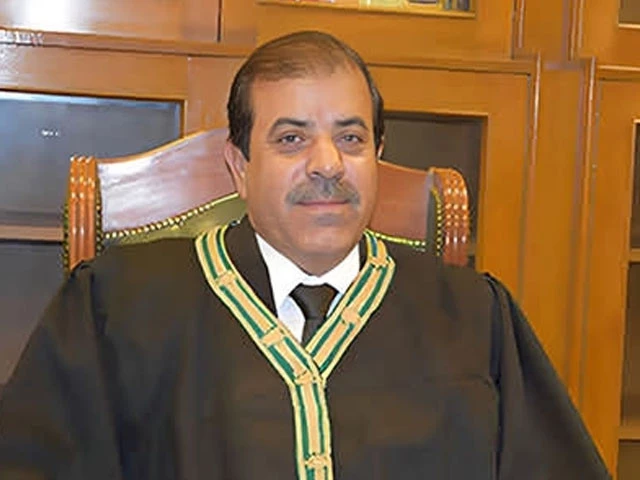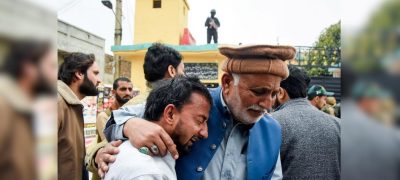The Chief Justice (CJ) of the Balochistan High Court (BHC) has officially taken notice of the alarming “honour” killing of a young couple in Quetta, a tragic event that has sparked widespread outrage. This notice follows the brutal murder of a couple, reportedly executed by their own family members, due to an inter-caste marriage that was deemed unacceptable by traditional standards. The couple’s horrific death, reportedly in the name of family “honour,” has raised serious questions about the persistence of such outdated practices in the modern age.
Read Aslo : Police Arrest 11 in Balochistan Honour Killing Case
The Balochistan High Court’s intervention is significant, drawing attention to the deeply rooted cultural norms that continue to lead to these senseless killings. Honour killings, particularly in rural and conservative regions, have remained a pervasive problem despite legal efforts to address them. The BHC CJ’s swift action signals that the courts are now taking more proactive steps in dealing with such heinous acts of violence.
The Couple’s Murder: What Happened BHC ?

According to local reports, the couple, who were both in their early twenties, were living together despite strong opposition from their families. Their relationship, which was based on mutual love and respect, violated traditional caste norms and was viewed as a dishonourable act by the families involved. In many parts of Pakistan, inter-caste marriages, especially those outside of arranged customs, are seen as a direct affront to family pride and societal expectations.
The couple had faced constant threats and intimidation from their families in the weeks leading up to the murder. Sources suggest that the families had repeatedly warned the couple, trying to force them to separate. Despite this, the couple remained steadfast in their relationship, which ultimately led to the tragic outcome. The couple was killed by their own relatives in what has been described as a cold-blooded act of revenge.
Details of the Investigation: Legal Action Underway
In the wake of the incident, the Balochistan High Court CJ took immediate action, ordering the police to conduct a thorough investigation into the murders. The BHC CJ emphasized the need for a detailed and impartial probe, ensuring that the perpetrators are held accountable for their actions. The BHC CJ’s involvement underscores the importance of providing justice for the victims, while also addressing the root causes of honour killings in the region.
The court has instructed the police to identify and arrest all individuals involved in the murder, including those who may have aided or abetted the crime. Furthermore, the CJ has demanded that the investigation be conducted transparently, with the full cooperation of local authorities and the public. The goal is to ensure that such crimes are not treated as acceptable under any circumstance, particularly under the guise of protecting family honour.
Cultural Context: Why Honour Killings Continue
Honour killings are not new in Pakistan, particularly in rural areas where traditional views on gender roles and family honour dominate. These killings are often justified by perpetrators as a means of protecting or restoring family honour when a family member is perceived to have dishonoured the family in some way. The practice, which predominantly affects women, is rooted in patriarchal customs that view women’s actions as a reflection of their family’s honour.
In many cases, a woman’s refusal to marry within her caste, her participation in a relationship without family consent, or even allegations of infidelity can lead to violence, often resulting in death. While the laws of Pakistan have been amended to criminalize honour killings, the cultural mindset that permits such practices persists, making it difficult to eliminate this crime completely.
Legal Challenges and Reforms: Progress or Stagnation?
Pakistan has made significant strides in terms of legal reform to combat honour killings. In 2016, the country passed a landmark law that closed the loophole allowing perpetrators of honour killings to be pardoned by the victim’s family. The law, which requires the state to act as the plaintiff in cases of honour killings, was a step toward ending the cycle of impunity for such crimes. However, despite these legal advancements, the societal attitudes that condone honour killings continue to pose a major challenge to their eradication.
In the case of the murdered couple in Balochistan, the legal system must ensure that justice is not delayed or compromised. The high court’s involvement indicates that the judiciary is taking the matter seriously, but it remains to be seen whether these efforts will translate into real change in society. It will also be crucial to provide support for the victims’ families and survivors of honour-related violence, ensuring that they feel safe to speak out against such practices.
The Role of the Balochistan High Court BHC CJ
The involvement of the BHC CJ in this case marks a significant step toward holding perpetrators accountable for their crimes. By taking notice of the issue and demanding a swift investigation, the court is sending a clear message that honour killings will not be tolerated. This proactive approach could serve as a model for other regions in Pakistan where similar crimes occur with alarming regularity.
The CJ’s intervention also brings to light the growing recognition of the need to challenge deeply ingrained cultural norms. While the courts cannot singlehandedly change societal attitudes, their actions can send a strong signal to the public that honour killings are not acceptable and will not be overlooked.
Public Reactions and Calls for Change
The news of the BHC CJ’s intervention has been met with mixed reactions. Human rights organizations have welcomed the court’s decision, emphasizing the need for greater accountability in honour killing cases. These groups argue that the justice system must ensure that individuals who commit such crimes face appropriate legal consequences.
However, there are also concerns about the implementation of laws and the cultural shift required to fully address the issue. Despite the legal provisions, many believe that until there is a broader societal change in attitudes towards women and family honour, such incidents will continue to occur.
The tragic murder of the couple in Balochistan has highlighted the ongoing issue of BHC honour killings in Pakistan. The Balochistan High Court’s intervention serves as a reminder that the legal system must play an active role in addressing these crimes. While legal reforms have been implemented, much work remains to be done in shifting cultural attitudes and eliminating the practice of honour killings altogether.
As the investigation into this case progresses, the hope is that justice will be served, and that this incident will catalyze further action to protect vulnerable individuals and challenge outdated cultural norms. Only through a comprehensive approach involving legal, cultural, and social change can the cycle of honour killings be broken once and for all.







